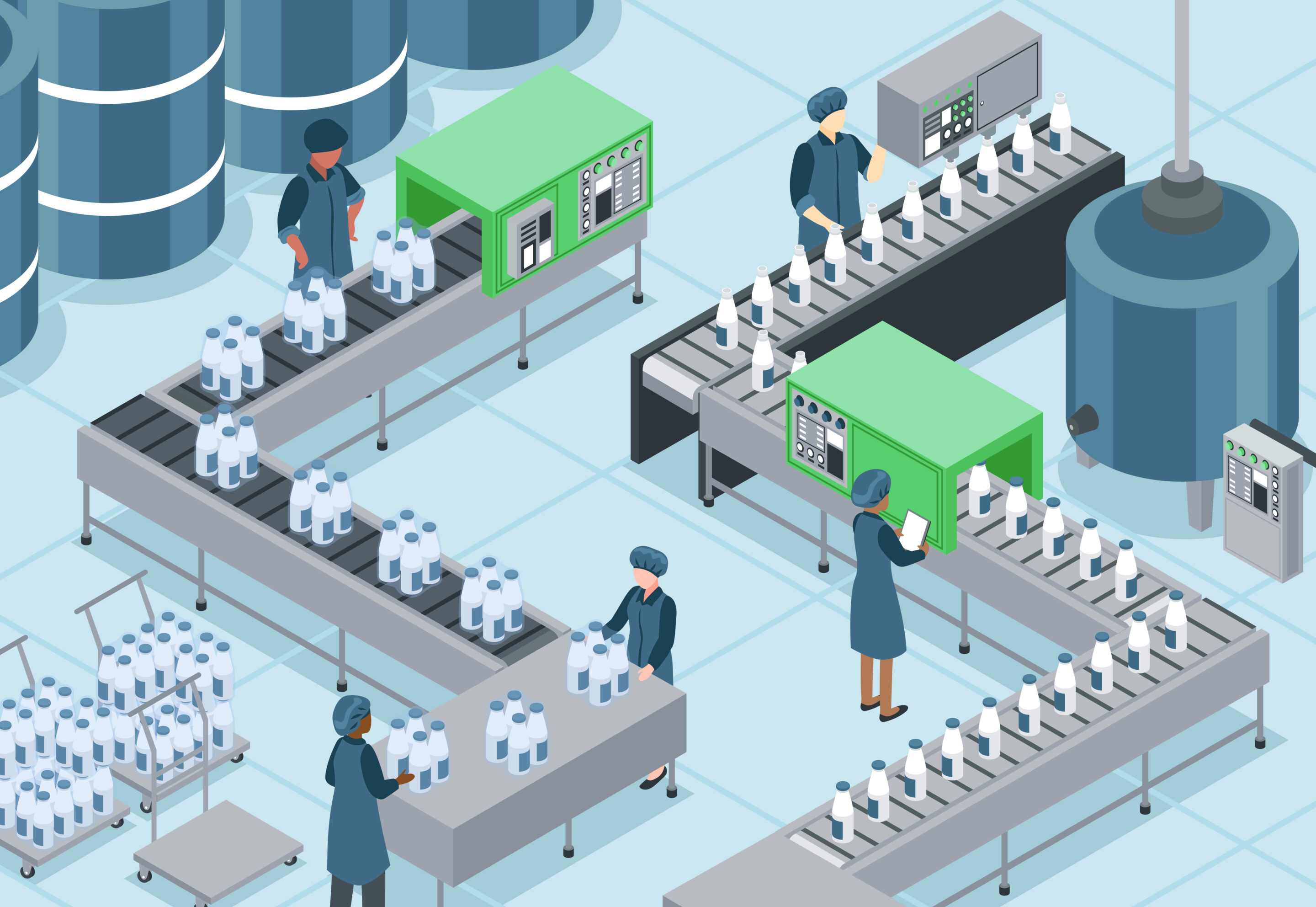California has a reputation for having some of the most progressive labor laws in the country. These laws are designed to protect workers’ rights and ensure fair treatment in the workplace. However, they can also be complex and challenging for businesses to navigate. This article provides an overview of recent labor law changes in California and their implications for the food and agribusiness sector, courtesy of Downey Brand’s 2024 Annual Employment Law Briefing.
Minimum Wage Increase in the Food and Agribusiness Sector
California’s minimum wage has been steadily increasing in recent years. In 2024, the state’s minimum wage has increased to $16 per hour. Food and agribusinesses are implementing technology and automation, streamlining operations, and increasing productivity to adapt to the increased labor costs. Technological advances can increase labor efficiency while also improving the experience of workers, as 3P Partners explored in a previous article, Balancing Efficiency with the Human Element: Advanced Tech in Food & Agriculture.
Addressing Sick Leave and Reproductive Loss Leave
California has expanded paid sick leave entitlements for employees from three days to five days annually. The new law also increases the annual accrual cap from three days to five days and the total accrual cap from six days to ten days.
Additionally, California has introduced reproductive loss leave, which provides employees with up to five days of unpaid leave after a reproductive loss event, including “a failed adoption, failed surrogacy, miscarriage, stillbirth, or an unsuccessful assisted reproduction” (California Department of Human Resources).
To comply with California’s new leave policies, food and agribusinesses should review their existing policies and make any necessary updates. Additionally, businesses should communicate their leave policies to employees and provide training on how to use them.
Cannabis Testing and Discrimination Laws
New laws prohibit California employers from discriminating against employees based on their off-duty use of cannabis. These laws apply to hiring, termination, and disciplinary decisions, and prohibit employers from inquiring about job applicants’ prior use of cannabis.
With these new regulations, employers are faced with the challenge of balancing safety concerns with employee rights. While employers may still utilize drug testing in hiring or incident investigation, the type of test matters. Drug testing for marijuana must generally now detect THC, the psychoactive compound in marijuana.
This means employers should generally stop using drug tests that only detect non-psychoactive metabolites of cannabis, which can be detected weeks after use, such as traditional urine tests. Instead, employers can adopt saliva-based oral fluid tests that detect THC. Employers should also review their application materials, hiring processes, and workplace drug policies to distinguish between impairment in the workplace and protected off-duty cannabis use.
Non-Compete Agreements
Non-compete agreements are contracts that restrict employees from working for a competitor or starting a competing business for a certain period after leaving their current employer. In California, non-compete agreements are generally unenforceable.
California recently passed laws that further restrict the use of non-compete agreements. Under the new laws, employers are prohibited from requiring employees to enter into non-competition agreements or including them as clauses in employment contracts.
This leaves food and agribusinesses with concerns about how to protect proprietary business information and trade secrets in a competitive industry. Downey Brand attorney, Alexandra LaFountain, notes that non-disclosure agreements (NDAs) and confidentiality agreements can often still be used to protect sensitive and confidential business information. She also recommends that employers “disclose private company information on a need-to-know basis.” In other words, businesses should only give employees confidential information when it is necessary to perform their job duties.
Arbitration Agreements
Arbitration agreements are contracts that require employees to resolve disputes with their employer through arbitration rather than through the court system. In California, arbitration agreements are generally enforceable, but they must be fair and reasonable.
Recent court cases have highlighted the limits of arbitration agreements as they apply to non-individual claims. In one of these cases, Adolph vs. Uber Technologies, the Supreme Court of California held that even if a plaintiff’s individual California Private Attorneys General Act (PAGA) claim is compelled to arbitration, that employee may still be able to pursue a representative PAGA claim on behalf of other employees in court.
Even so, Daria Gossett of Downey Brand notes that arbitration agreements can still be a “beneficial tool” to more promptly resolve employee disputes and limit the scope of claims filed and resolved in court. Because individual PAGA claims may still be compelled to arbitration, she recommends that arbitration agreements continue including individual PAGA waivers. She also recommends they include language requiring all non-arbitrable claims, including representative PAGA claims, to be stayed in court until the arbitrator resolves the employee’s individual claims.
Retaliation Liability Prevention
Retaliation liability occurs when an employer takes adverse action against an employee for engaging in protected activity, such as filing a complaint or participating in an investigation. A new California law creates a rebuttable presumption of retaliation if an adverse action is taken within 90 days of an employee engaging in protected activity. This can make it easier for an employee to prove their retaliation claim by shifting the burden of proof to the employer to show “a legitimate, non-discriminatory reason for their act(s).”
To minimize the risk of retaliation claims, Farah Amjad of Downey Brand recommends that employers review their disciplinary policies, including procedures for documenting performance and addressing disciplinary issues. Furthermore, they should ensure that human resources staff are trained in thorough documentation practices.
Summary
Recent labor law updates in California will have an immediate impact on the food and agribusiness sector. California businesses will need to adapt to changes such as minimum wage adjustments, leave policies, cannabis testing and discrimination laws, non-compete agreements, arbitration agreements, and retaliation liability prevention. These developments underscore the importance of staying informed and compliant with the changing legal landscape in California.
For guidance on navigating recent developments in employment law for your business, contact Downey Brand.

Alexandra LaFountain | Partner at Downey Brand
Alexandra LaFountain advises clients on a wide array of employment matters and helps them promptly resolve disputes with current and former employees.
In her litigation practice, Alex defends employers in wage and hour class actions and lawsuits involving claims for harassment, discrimination, wrongful termination, and unfair business practices. Alex has experience in all phases of the litigation process, including pretrial pleading and motion practice, written discovery and depositions, expert discovery, and trial. She has also appeared and prevailed in numerous matters before the California Labor Commissioner.
In her counseling practice, Alex provides guidance to public and private employers on a broad range of wage and hour issues. She also helps them design and implement company-wide policies that comply with California’s complex labor laws.
In addition to her employment practice, Alex represents clients in a diverse array of appellate matters. She has handled appeals involving administrative law, probate, anti-SLAPP, inverse condemnation, and jury selection issues, among others.
Contact Alex
916.520.5245 Direct
alafountain@DowneyBrand.com
www.downeybrand.com

Daria Gossett | Senior Associate at Downey Brand
Daria Gossett’s practice encompasses all aspects of general and complex civil litigation, spanning all phases of the litigation process, from pre-lawsuit demands to post-judgment appeals.
In today’s challenging economic climate, Daria is able to develop both legal and non-legal solutions to secure successful and cost-effective results for clients by utilizing an informed and practical approach. Recognizing that cases are often won or lost on written briefs submitted to the court, Daria uses her strong analytical and writing skills to present her clients’ cases in the most succinct and compelling manner.
Blending sharp advocacy with creative thinking, Daria litigates cases and advances the interests of her clients through trial and appeal in state and federal courts, as well as before arbitration panels.
Contact Daria
916.520.5383 Direct
dgossett@downeybrand.com

Farah Amjad | Associate at Downey Brand
Farah Amjad represents clients from diverse backgrounds and industries in litigation and employment law matters.
Farah uses her creative and sharp analytical skills to find efficient solutions to pressing and complex questions involving California’s employment and labor laws. In her current practice, she excels in counseling and discovery, a result of critical work alongside notable firm partners and senior associates. In addition, Farah is an adept researcher and writer, exemplified by her roles as a Senior Articles Editor for the UC Davis Law Review and as a copyeditor and fact-checker prior to attending law school. Her strengths in verbal and written advocacy stem from her ability to listen attentively and mindfully, a skill she developed early as a multilingual person and later strengthened through cross-cultural and interfaith experiences around the world.
Contact Farah
916.520.5282 Direct
famjad@downeybrand.com
Need to hire HR talent? Click here to speak to an expert at 3P Partners for streamlined hiring solutions.

